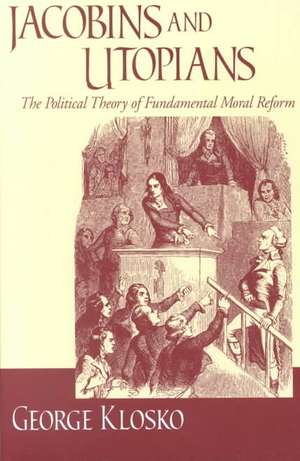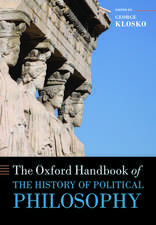Jacobins and Utopians – The Political Theory of Fundamental Moral Reform: Frank M. Covey, Jr., Loyola Lectures in Political Analysis
Autor George Kloskoen Limba Engleză Paperback – 14 feb 2003
Jacobins and Utopians examines the politics of ideal societies and the means necessary to bring them into existence. George Klosko reveals how discussions of fundamental moral reform lead inexorably to questions of political power. Machiavelli classically articulated the claim that unarmed prophets go to the gallows. Themes of revolution play an integral role in Klosko’s study—as the figures he explores frequently concerned themselves with the means of becoming armed.
Klosko focuses particularly on what he calls “educational realism” as a means of channeling political power in pursuit of moral reform. If people are to become fit for an ideal society they must be subjected to intensive education, which in turn requires control of the educational environment and, consequently, of society as a whole. Klosko identifies Plato as an educational realist and contends that Plato, contrary to his reputation as a pure utopian, actually provides a searching analysis of the role of political power in fundamental moral reform. In addition to Plato, Jacobins and Utopians canvasses strategies of moral reform proposed by Plutarch's Lycurgus, Socrates, Thomas More, Machiavelli, Robespierre, Saint-Just, Bakunin, Charles Fourier, Marx, and Lenin. Klosko analyzes both the advantages of Jacobinism as a political strategy and its inherent flaws.
Klosko focuses particularly on what he calls “educational realism” as a means of channeling political power in pursuit of moral reform. If people are to become fit for an ideal society they must be subjected to intensive education, which in turn requires control of the educational environment and, consequently, of society as a whole. Klosko identifies Plato as an educational realist and contends that Plato, contrary to his reputation as a pure utopian, actually provides a searching analysis of the role of political power in fundamental moral reform. In addition to Plato, Jacobins and Utopians canvasses strategies of moral reform proposed by Plutarch's Lycurgus, Socrates, Thomas More, Machiavelli, Robespierre, Saint-Just, Bakunin, Charles Fourier, Marx, and Lenin. Klosko analyzes both the advantages of Jacobinism as a political strategy and its inherent flaws.
Preț: 184.13 lei
Nou
Puncte Express: 276
Preț estimativ în valută:
35.24€ • 36.74$ • 29.29£
35.24€ • 36.74$ • 29.29£
Carte tipărită la comandă
Livrare economică 20 martie-03 aprilie
Preluare comenzi: 021 569.72.76
Specificații
ISBN-13: 9780268032586
ISBN-10: 0268032580
Pagini: 212
Dimensiuni: 152 x 229 x 12 mm
Greutate: 0.34 kg
Ediția:1
Editura: MR – University of Notre Dame Press
Seria Frank M. Covey, Jr., Loyola Lectures in Political Analysis
ISBN-10: 0268032580
Pagini: 212
Dimensiuni: 152 x 229 x 12 mm
Greutate: 0.34 kg
Ediția:1
Editura: MR – University of Notre Dame Press
Seria Frank M. Covey, Jr., Loyola Lectures in Political Analysis
Recenzii
“Jacobins and Utopians offers an extremely interesting and thought-provoking analysis of the relationship between political power and fundamental political and moral reform.”
“The detailed analyses of individual theorists and practitioners are most profitable. Well written and convincing. . .".
“A survey of remarkable breadth and depth.”
“. . . A welcome additional perspective to studies of fundamental change . . . Much of the value and enjoyment of Jacobins and Utopians lies in the author’s explorations of dilemmas of fundamental moral reform and his uncovering of the ways in which many major theorists discovered and grappled with (or found themselves unable effectively to grapple with) those dilemmas.”
Notă biografică
George Klosko is Henry L. and Grace Doherty Professor of politics at the University of Virginia.














